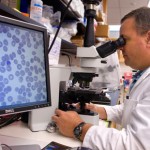We can’t ignore the little things that keep us alive.
by David Suzuki
Scientists believe life appeared on Earth almost four-billion years ago, about half a billion years after our relatively young planet formed. It would be fascinating to see how life arose and managed to hang on.
If scientists were to invent time travel to take us back through Earth's history, we'd see little life for most of the four-billion years. Plenty was happening but at a microscopic level as organisms worked out all the intricacies of survival: finding food and energy, evading predators, fighting off disease (even bacteria get virus infections), reproducing and eliminating waste.
 David T Suzuki, PhD, Chair of the David Suzuki Foundation, is an award-winning scientist, environmentalist and broadcaster.
David has received consistently high acclaim for his 30 years of award-winning work in broadcasting, explaining the complexities of science in a compelling, easily understood way. He is well known to millions as the host of the Canadian Broadcasting Corporation's popular science television series, The Nature of Things. An internationally respected geneticist, David was a full Professor at the University of British Columbia in Vancouver from 1969 until his retirement in 2001. He is professor emeritus with UBC's Sustainable Development Research Institute. From 1969 to 1972 he was the recipient of the prestigious EWR Steacie Memorial Fellowship Award for the "Outstanding Canadian
Research Scientist Under the Age of 35".
For more insights from David Suzuki, please read Everything Under the Sun (Greystone Books/David Suzuki Foundation), by David Suzuki and Ian Hanington, now available in bookstores and online.
This article is reprinted with permission.
David T Suzuki, PhD, Chair of the David Suzuki Foundation, is an award-winning scientist, environmentalist and broadcaster.
David has received consistently high acclaim for his 30 years of award-winning work in broadcasting, explaining the complexities of science in a compelling, easily understood way. He is well known to millions as the host of the Canadian Broadcasting Corporation's popular science television series, The Nature of Things. An internationally respected geneticist, David was a full Professor at the University of British Columbia in Vancouver from 1969 until his retirement in 2001. He is professor emeritus with UBC's Sustainable Development Research Institute. From 1969 to 1972 he was the recipient of the prestigious EWR Steacie Memorial Fellowship Award for the "Outstanding Canadian
Research Scientist Under the Age of 35".
For more insights from David Suzuki, please read Everything Under the Sun (Greystone Books/David Suzuki Foundation), by David Suzuki and Ian Hanington, now available in bookstores and online.
This article is reprinted with permission.


